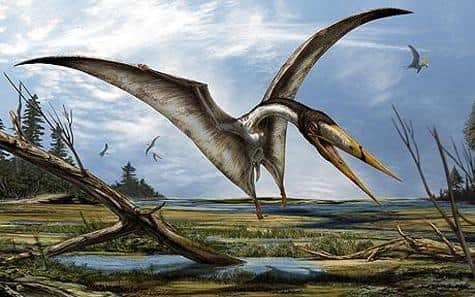Mysterious flying reptile that soared above dinosaurs discovered by Portsmouth researchers
and live on Freeview channel 276
Palaeontologists made the surprising discovery while searching through 100-year-old fossil collections in the Sedgwick Museum of Cambridge and the Booth Museum at Brighton.
University of Portsmouth PhD student Roy Smith was examining fossils of shark spines – when he realised that some of the fossils were not like the rest.
Advertisement
Hide AdAdvertisement
Hide AdThe fossils were actually fragments of jaws of toothless pterosaurs, a type of flying reptile that lived more than 60 million years ago, according to the Portsmouth student.


He said: ‘One such feature are tiny little holes where nerves come to the surface and are used for sensitive feeding by the pterosaurs. Shark fin spines do not have these, but the early palaeontologists clearly missed these features.
‘Two of the specimens discovered can be identified as a pterosaur called Ornithostoma, but one additional specimen is clearly distinct and represents a new species.
‘It is a palaeontological mystery.’
But the fossils are too fragmented to form the basis for naming a new special, according to Roy.
Advertisement
Hide AdAdvertisement
Hide AdHe added: ‘Sadly, it is doubtful if any more remains of this pterosaur will be discovered, as there are no longer any exposures of the rock from which the fossils came.
‘But I’m hopeful that other museum collections may contain more examples, and as soon as the Covid restrictions are lifted I will continue my search.’
Professor Dave Martill, who specialises in the research of pterosaurs at the University of Portsmouth, said: ‘The little bit of beak is tantalising in that it is small, and simply differs from Ornithostoma in subtle ways, perhaps in the way that a great white egret might differ from a heron.
‘This is extremely exciting to have discovered this mystery pterosaur right here in the UK.
Advertisement
Hide AdAdvertisement
Hide Ad‘This find is significant because it adds to our knowledge of these ancient and fascinating flying prehistoric reptiles, but also demonstrates that such discoveries can be made, simply by re-examining material in old collections.’
It comes after a different team from the University of Portsmouth discovered a new species of pterosaur last month.